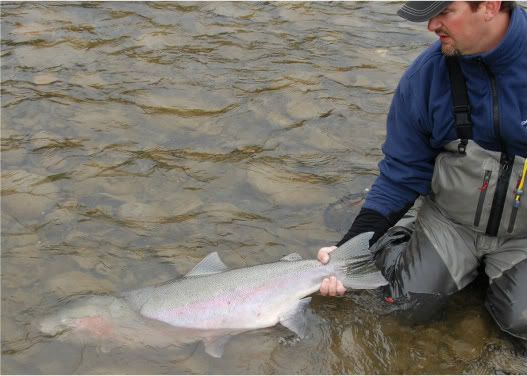From the Center for Global Food Issues... Federal Judge Kept in Dark About Recovering Salmon By:Dennis Avery
A federal judge recently rejected the government's plan for salmon recovery in the Pacific Northwest because it wouldn't breach four dams on the Snake River that environmental groups claim are killing the fish.
I feel sorry for the judge, James Redden of Portland, OR. Neither the government's National Marine Fisheries Service (designer of the plan) nor the 17 eco-groups suing to get the dams breached have been willing to tell him that the Northwest salmon are in no danger from logging, farming, pollution--or the dams. They're already recovering, without any federal plan.
Last year's Columbia River salmon runs were the best in more than a decade. The total for Columbia River chinook salmon was the largest on record!
The real reason for the 25-year decline in Oregon-Washington salmon -- and its resurgence in the last two years -- is a natural cycle that shifts the salmon food back and forth between the Pacific Northwest to the Gulf of Alaska. When Oregon has salmon, Alaska doesn't, and vice versa.
The fishermen have known about this natural cycle for almost a century.
In 1939, the Pacific Fisherman Yearbook wrote:
"The Bristol Bay [Alaska] Red [sockeye salmon] run was regarded as the greatest in history. . . . The [May, June and July Chinook] catch this year is one of the lowest in the history of the Columbia [Washington and Oregon]."
In 1972, the National Fisherman said:
"Bristol Bay [Alaska] salmon run a disaster . . .Gillnetters in the Lower Columbia [Washington and Oregon] received . . .the largest run of spring chinook since counting began in 1938."
Pacific Fishing wrote in 1995:
"Alaska set a new record for its salmon harvest in 1994, breaking the record set the year before. . . . Columbia [Washington and Oregon] spring Chinook fishery shut down; west coast troll coho [salmon] fishing banned."
The scientists call it "co-variance" an event that impacts two separate situations in opposite ways. The event is a huge, robust recurring pattern of ocean-climate variability called the Pacific Interdecadal Climate Oscillation. It shifts the phytoplankton (which feed the bait fish that feed the salmon) back and forth between the Washington-Oregon coast and Alaska every 25 years or so.
When the Pacific Northwest salmon catches began to decline after 1975, the environmental groups told us logging and farming were killing the fish by allowing more sediment to reach salmon spawning streams. The logging was sharply reduced, but no salmon recovery occurred.
Then the eco-activists said the problem was dams, and huge amounts of cash were spent making the dams and power plants more fish-friendly. The salmon continued to decline.
There were no big manmade stream changes in the last two years to trigger the current salmon recovery. The Portland Oregonian credited "changes in ocean conditions" without mentioning the natural cycle.
The Oregonian doesn't want to admit it's been fanning an eco-hoax for the past two decades. The federal fishery managers don't want to give up their crisis funding. The eco-groups want to get rid of the dams and their electrical generating capacity. All continue to mislead the public.
Noting that President Bush has described the dams as crucial to the economic life of the Pacific Northwest, Carl Pope of the Sierra Club said "We are not so rich that we can afford to lose our wild salmon or so poor that we must keep the Snake River dams that are killing them."
The National Wildlife Federation said, "By rejecting the administration's salmon plan because it lacks scientific credibility, the door is open to fashioning a plan based on sound science that will save salmon."
However, Dr. Nathan Mantua, of the University of Washington's Joint Institute for the Study of the Atmosphere and Oceans, notes that the Pacific Oscillation reversed itself in 1925, 1947, and 1977. The latest reversal is right on schedule. Dr Mantua also says federal and state fish management cannot alter the dominant role of ocean conditions in the salmon cycle. He expects the Northwest's salmon catches to surge for the next two decades, with or without Sierra Club help.
Sacrificing thousands of jobs for dam breaching would help the salmon no more than did sacrificing thousands of logging jobs when the Feds shut down the forests.
I'm going to do my part for the future of the Pacific Northwest. I'm going to mail Judge Redden -- and President Bush -- a copy of this column, along with Dr. Mantua's 1997 peer-reviewed paper from the Bulletin of the American Meteorological Society.
















 Previous Topic
Previous Topic Index
Index

